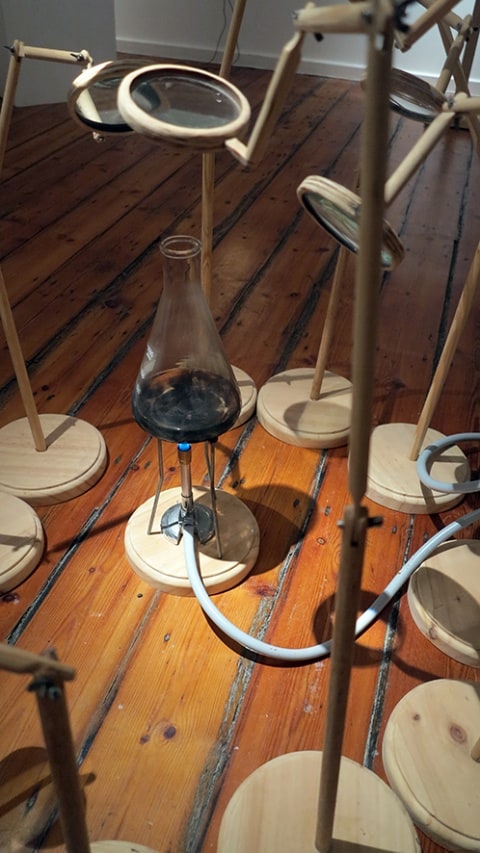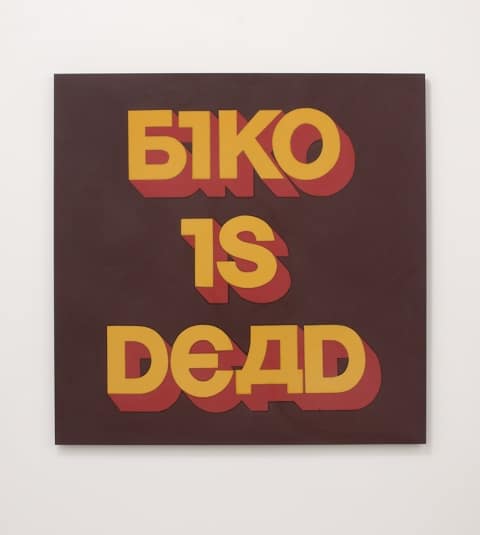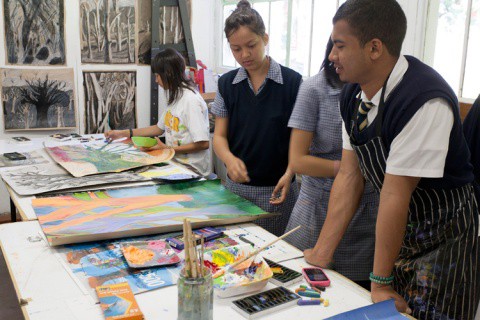The Home Movie Factory, brainchild of acclaimed French director Michel Gondry, has anchored in Johannesburg and is currently hosted by the Bioscope theatre as part of France–South Africa Seasons 2012 & 2013.
A completely free filmmaking workshop, the Factory opened on August 28 and runs from September to October. To clarify the first inevitable question: no, Gondry himself is, unfortunately, not present. He is still the mastermind behind it though, pronouncing the Factory as the culmination of several attempts to create a film workshop aimed at teaching a specific, valuable principle: ‘perfection is the enemy’. With this advice Gondry invites people of random professions to experience the essence of filmic storytelling while also welcoming filmmakers to reassess their understanding of the process.

Participants in the Home Movie Factory. Photo: Brendan Copestake
Gondry has a repertoire of feature films, music videos and commercials under his belt. His feature film career debuted with Human Nature (2001) and followed with the critically acclaimed Eternal Sunshine of the Spotless Mind (2004), written by the creative genius of Charlie Kaufmann. Other notable films include The Science of Sleep (2006) and Be Kind Rewind (2008). Gondry has a flair for the imaginative and a penchant for surrealism, to which he lends his unique, playful method of storytelling to create films with a signature distortion of realism. The emotional arc of his characters takes precedence over strict narrative structures and the audience is charmed into a far more active suspension of disbelief than is usual in commercial cinema.

Sets for the Home Movie Factory. Photo: Brendan Copestake
The Factory is a free 3-hour workshop in which a group of up to 15 people plan, shoot and eventually watch their own short film. The group is given a brief tour of the pre-made sets available, which range from cars with moving roads projected behind them to create the impression of driving, to a fully furnished café, mineshaft, church and informal settlement, amongst others. The sets will make film students drool, inviting opportunities not normally available to amateur filmmakers. Groups are given two 45-minute planning phases, where the film’s story is planned from the ground up, starting with the decision about genre and title. All decisions are made democratically by show of hands and eventually a director/cameraman is selected. Everyone else assumes acting roles with a small storeroom of props and costumes provided. The process carries the distinct Gondry influence in its use of modified ready-made objects in the creation of props and mise-en-scene a la Science of Sleep and Be Kind Rewind. Next comes the 45-minute shooting phase, where the group manically rushes from set to set, filming roughly planned scenes on a small camcorder with on-board microphone. No rewinding and reshooting is allowed and all editing is done in-camera using only the record button. Afterwards, the film is burned to DVD and screened.
The workshop caters to the entire spectrum of experience. For those unfamiliar with filmmaking, it is a playful introduction to the process, showcasing just how easy it can be. Concurrently, amateurs and veterans alike should learn something valuable. Because of the typically large resources involved with making a film, the undertaking tends to seem daunting and the achievement of perfection is regarded as paramount. With big money at stake, the pressure to produce a ‘perfect’ product with fidelity to its concept can be overwhelming. The workshop is a paradoxical inversion of what an amateur usually has available. Most of the control (over lighting, editing, rehearsals) is removed, leaving only a basic camera. Meanwhile, the imaginative potential of the process is boosted by the availability of striking, skilfully constructed sets.


Sets for the Home Movie Factory. Photo: Brendan Copestake
This is Gondry’s subtle machination at play. By ruthlessly eradicating the pressure of perfection he reveals a method of bare-bones storytelling, which encourages a spirit of filmmaking as play – undoubtedly the same philosophy that guides his own projects. Severe limitations notwithstanding, the process, counter-intuitively, frees you. The restraints on time and resource spawn a playful imaginative flourish where participants can embrace silliness and absurdity and savour mistakes instead of avoiding them. The process teaches you to relinquish control and idealisation. As you sit watching and inevitably laughing at the finished product, you may get the sense that somewhere, possibly remote-viewing you through a cardboard time machine, Gondry is chuckling with you.

Participants in the Home Movie Factory. Photo: Brendan Copestake
I’d recommend that anyone who enters the process with the plan to create an ideal short film should check those expectations at the door unless you want to walk away disappointed. Allow Gondry’s insights to remind you just how simple and playful visual storytelling can be and submit yourself to the chaotic play of an environment where limitation is liberation and expectation is fluid.
Dennis Dvornak is an aspiring amateur filmmaker and writer currently living in Johannesburg.
Dennis Dvornak



